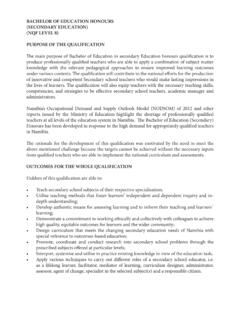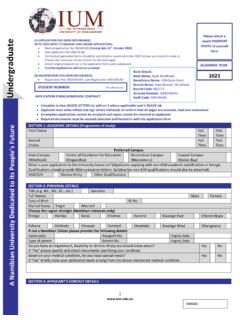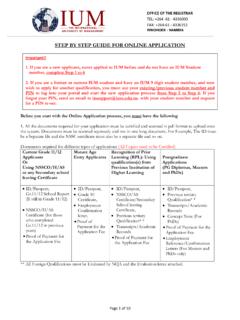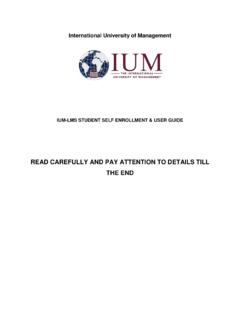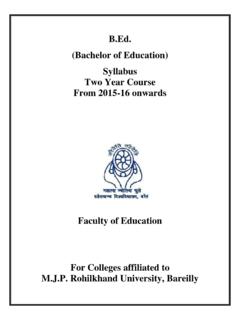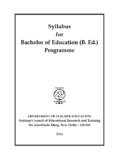Transcription of BACHELOR OF EDUCATION HONOURS (SENIOR PRIMARY) …
1 BACHELOR OF EDUCATION HONOURS . ( senior primary ). (NQF LEVEL: 8). Rationale and Purpose of the Qualification EDUCATION is an important factor both in the day-to-day development of the child and in contributing to the personal, social, cultural and economic fulfilment of the future adult. The design and introduction of this qualification by the IUM is, therefore, a significant educational development for it bridges early childhood EDUCATION with adolescence - secondary school EDUCATION in ensuring that there is proper continuity in the EDUCATION process.
2 This qualification also incorporates new content and embraces new approaches and methodologies in teaching and learning, building on the earlier emphasised numeracy and reading. A key concern of the qualification is the importance of literacy and numeracy to personal fulfilment. The curriculum also responds to changing needs, particularly in the areas of science and technology, social, personal and health EDUCATION , and citizenship, and in taking account of the initiative in modern languages. In preparing teachers for the senior primary EDUCATION sector, this qualification guides and facilitates student teachers' initial entry into teaching and provides a solid theoretical foundation to support and aid their preparation for professional practice within the classroom.
3 This qualification is designed to produce teachers with an in-depth understanding of the subject matter, sound professional skills and ability to adapt to the ever-changing educational needs in Namibia. Its focus is on quality instruction and teaching in the senior primary school. This qualification aims at improving the competency of senior primary school teachers in quality teaching and class management skills which are presently largely lacking mainly in public schools in Namibia. This qualification, therefore, intends is to improve the quality of senior primary school teaching, instruction and classroom management.
4 Qualification Duration The study period for the qualification is: Fulltime/Part-time mode/block release - Minimum: 4 Years; Maximum: 6 Years. The study period comprises of two (2) semesters, per academic year. Semester 1 runs from January to June. Semester 2 runs from July to December. Outcomes for the whole qualification Holders of this qualification are able to: Demonstrate mastery in teaching at least two (2) school subjects taught at senior primary school level;. Demonstrate competency in at least two (2) subject matter content and pedagogical knowledge and skills.
5 Demonstrate creativity and ingenuity to discovery, comprehension, control and adaptation of senior primary school teaching methodologies to new technologies;. Demonstrate ability to develop the learners' ability in creative thinking, problem solving and communication skills. Demonstrate awareness, understanding and commitment to professional ethics, basic human rights and sound environmental responsibility;. Demonstrate capability and capacity to produce and use relevant learning materials; and Demonstrate leadership and classroom managerial skills.
6 ARTICULATION. Vertically, the BACHELOR of EDUCATION ( senior primary ) HONOURS grants admission to Master of EDUCATION . Interfaculty students can apply for approval with the Deans of other Faculties for assessment to gain admission to any Masters programme. Horizontally, students may, where applicable, move into existing or new related undergraduate teaching qualifications. This qualification is designed for senior primary school teachers willing to take up teaching assignments in both the private and public schools. It is structured to stretch and challenge the senior primary school teachers to fulfil their true potential and to become defining players in the EDUCATION system.
7 The basis for the argument is that a senior primary school teacher must first be a student and this qualification targets those individuals willing to become students and then be transformed into professional senior primary school teachers CREDIT TRANSFER. Credit is the value assigned for the recognition of equivalence in content acquired learning outcomes between different types of learning and/or qualifications. Credit reduces the amount of learning required to achieve a qualification and may be through credit transfer, articulation, recognition of prior learning or advanced standing.
8 To be awarded these credits, IUM will need to assess the courses or combination of courses as equivalent to IUM courses. Courses awarded as credits need to have been studied within the past 5 years. Generally, credit will be given if the courses were taken at an accredited institution of higher learning, the course was equivalent to courses offered at IUM, or compatible with Namibian Qualification Authority requirements. Courses will be evaluated for its current relevance and may not transfer if the material is outdated more than 5 years since the course was attended and examination sat and passed and/or the course was not passed at the first examination sitting.
9 Credits earned at an unaccredited college may not transfer unless the credit earned is equivalent to courses offered in degree qualification. Credits earned at IUM are also transferable to other institutions of higher learning. Acceptance of credits earned at other institutions is limited to 50%. of the total credits required for an IUM qualification. No more than half the major area course requirements can be earned through transfer and/or exemption credit. The IUM reserves the right to reject any or all credits from other institutions, regardless of their accreditation status, when it determines through investigation or otherwise that the quality of instruction at such institutions is for any reason deficient or unsatisfactory.
10 The judgment of the IUM on this question shall be final. The IUM reserves the right to disallow transfer credit for courses if the student's subsequent grades in required courses in the same subject fall below average Major Combinations The core courses for this qualification are fixed and cannot be exchanged. The qualification is offered in four (4) specialisations and each specialisation has a number of school subject combinations. In addition to that students have option to elect one course from pre-vocational subjects and one course from supportive subject that runs up to year three.

